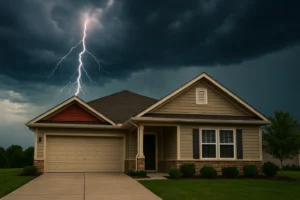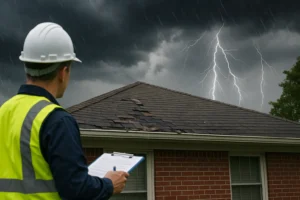“Fire damage costs American homeowners billions of dollars each year, and a single spark can turn a lifetime of memories into ashes in minutes.” This isn’t just an abstract statistic—it’s the brutal reality many people face after a house fire. Knowing how to protect yourself and recover after fire damage is crucial for your peace of mind and financial security.
Fire damage can devastate your property, whether it’s your home, business, or rental property. Understanding what to expect when fire strikes and how to approach the recovery process can make a big difference in your ability to rebuild and restore your property.
What Is Fire Damage?
Fire damage is not just about the flames. It includes smoke damage, water damage from firefighting efforts, and in some cases, damage from explosions. The consequences of a fire can affect the structure of your property and your personal belongings, leading to significant repair or replacement costs.
Beyond the fire itself, water used to extinguish the blaze can cause severe damage to floors, walls, and furniture. Smoke and soot can seep into every corner, ruining belongings and contaminating the air. That’s why it’s important to assess the full extent of the damage, so you can focus on what steps to take next.
How to Handle Fire Damage
When a fire strikes, the first thing to do after ensuring your safety is to assess the damage. Fire appraisers can help by inspecting the property, documenting the damages, and estimating repair costs.
Typically, fire damage recovery involves:
- Structural repairs – This includes repairing or rebuilding the walls, roof, foundation, and any built-in appliances affected by the fire.
- Restoration of personal belongings – Furniture, electronics, clothing, and other personal items may need to be cleaned, repaired, or replaced depending on the damage.
- Temporary living arrangements – If your home is uninhabitable due to the fire, you may need to consider temporary housing while repairs are being made.
After the fire is out, it’s essential to contact professionals like appraisers and contractors to begin the process of restoration and recovery. The sooner you act, the better your chances are of minimizing further damage and restoring your property effectively.
Key Takeaways for Recovering from Fire Damage
- Fire damage affects both the structure of your property and personal belongings.
- Smoke, water, and soot can cause extensive damage beyond the flames.
- Professional appraisers and contractors can help assess and estimate the damage for repairs.
- It’s important to act quickly to prevent further damage and start the recovery process.
Example of Fire Damage in Action
Imagine you own a modest home that experiences a kitchen fire. The fire spreads through the house, causing extensive damage to both the structure and your belongings. After contacting an appraiser to assess the situation, they provide a detailed report of the damages, including the cost to repair or rebuild parts of the home and replace lost items. With this information, you can begin coordinating repairs and replacements, ensuring that your home can be restored as soon as possible.
Special Considerations for Fire Damage
Different types of fires can result in varying levels of destruction. For example, grease fires in the kitchen may cause significant localized damage, while electrical fires can spread quickly and affect wiring throughout the home. Additionally, homes in areas prone to wildfires may face unique challenges due to the scale of destruction these fires can cause.
It’s also important to be aware of specific factors that can affect the extent of damage, such as faulty wiring or other pre-existing issues that may contribute to the severity of a fire.
What to Expect After a Fire
After the fire is out, expect a thorough inspection of your property. Appraisers will look at the structure, checking for visible and hidden damage. Sometimes, what appears to be minor fire damage can lead to long-term structural issues if not properly addressed.
Restoration specialists may need to clean the property to remove soot, smoke residue, and water damage. Depending on the extent of the fire, you may need to relocate temporarily while repairs are being made.
Common Exclusions for Fire Damage Coverage
Certain factors may not be covered or could complicate the recovery process, such as:
- Fires caused by intentional acts like arson
- Neglect of the property, such as faulty wiring or lack of maintenance leading to the fire
- Damage resulting from external causes like war or nuclear hazards
Understanding the limits and exclusions related to fire damage can help you take the necessary precautions to avoid these situations in the future.
Frequently Asked Questions (FAQs)
Yes, but it’s important to take additional precautions. You may face challenges with recovery if your property is in a high-risk area, so it’s essential to assess your fire prevention measures and ensure you are prepared for potential wildfires.
Yes, smoke and water damage are typically part of the fire recovery process. These can affect both the structure of the property and personal belongings, requiring thorough cleaning or replacement.
In most cases, fire damage from electrical fires can be addressed, but it’s crucial to address the underlying issues, like faulty wiring, to prevent future incidents.
Working with professional appraisers and contractors can help ensure that all damages are thoroughly assessed, and the necessary repairs and restorations are completed.






